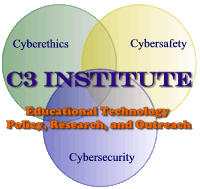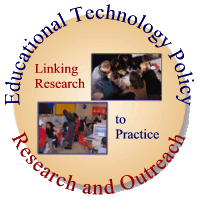

![]()
![]()
![]()
![]()
![]()
![]()
![]()
![]()
![]()
C3™ Institute: Goal 1
Raise community awareness of ethical, legal, safety, and security implications of technology use
Teaching children and young adults how to appropriately use technology is critical in preparing them for the 21st Century Workforce. The benefits of exposing children to the Internet at an early age and throughout their K-12 schooling are so vast that even recent legislation – The No Child Left Behind Act of 2001-- calls for every student to be “technologically literate” by the end of 8th grade.
Although the Internet provides great educational and economic benefits, there are risks children face while online. These risks could potentially become a major reason for educators and parents to avoid using the Internet in classrooms or at home. This would do our children a great disservice and decrease their opportunities to succeed in the future.
Educators and parents may not understand the need for a cyber security, safety and ethics curriculum in the classroom. As a result, there is a need to develop a communications and awareness strategy that informs educators, administrators and parents on the need for cyber security, safety and ethics in schools.
NCSA’s Cyber Security, Safety and Ethics Education Roundtable Cyber Awareness Campaign (2005)
C3™ Institute Goal 1 Initiatives:
- Roundtable Series: Partnering with The National Cyber Security Alliance (NCSA) and other supporting partners a roundtable series focusing on developing a “National Cyber Security, Safety, and Ethics Awareness Campaign,” was developed to decrease and eventually eradicate cyber crimes against children and teenagers, and increase national awareness about proper Cyber Security, Safety and Ethical Uses of technology and the Internet in today's setting [More]
- C3 Conference: The core mission of the C3 Conference is to inform the educational community about the ethical, legal, safety, and security implications of technology use. 2005 included a special emphasis on Cybersecurity, and 2006 includes a special focus on promoting Cyberethics. NSF funding has allowed us to expound upon the role of the IT professional in cybersecurity through scheduled pre-conference workshops. Participants will hear from a number of National Educational Technology and Information and Assurance Technology Experts on topics including Netiquette, Acceptable Use of Computing Resources, Viruses, Hoaxes and Trojan Horses, Backing up, Anti-Virus protection and Firewalls, Intellectual Property, Privacy, Security and Safety, Educational Curriculum Options, plagiarism and promoting ethical online behavior. [More]
- Interactive Cyberawareness month calendars: Setting your clocks forward or back for Daylight Saving Time and replacing the batteries in smoke detectors are rituals repeated every spring and fall. Similarly, April and October are good times to remind ourselves about Cyberawareness issues. C3™ Institute continues to plan a month’s worth of activities twice a year (April and October) to help promote the K-20 community’s awareness of cyber related issues and encourage safe online practices. Both an interactive calendar and a printable version are available. You can also print out Student Recognition forms for your class. [More]
- TappedIn Monthly Discussion Forum: The C3™ Institute leads a monthly discussion on various topics related to Cyberethics, Cybersafety and Cybersecurity the first Monday of each month at 8:00 PM Eastern Standard Time. Past transcripts of discussions can be found in the TappedIn archive room. [More]
- C3 Course: EDUC 473/698T, Cybersafety, Cyberethics and Cybersecurity (C3) for Educators: Ethical and Legal Implications for Classroom Technology is offered to both pre-service and in-service educators (teachers/administrators/tech coordinators/media specialists) each winter and summer sessions. The course is worth 3 credits from the University of Maryland, and is delivered online. [Learn more about the course syllabus, outline, past student work and evaluations]
- Research: The C3™ Institute has been actively engaged in studying the issues, problems, and relationships associated with Cyberethics, Cybersafety and Cybersecruity in the K-16 setting. Specifically, we have done extensive work exploring the perceptions, conceptualizations and practices of teachers and students in regards to C3 content and have developed a database of case study scenarios.
Go to: Goal 2
| Copyright © 2007 Educational Technology Policy, Reserach, and Oureach, Inc. http://www.edtechpolicy.org dpruitt@umd.edu |
 |